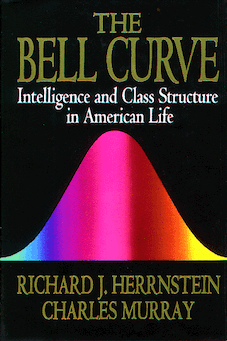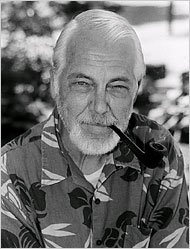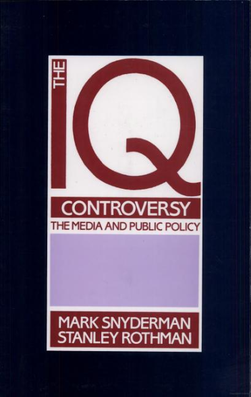Related Research Articles

Arthur Robert Jensen was an American psychologist and writer. He was a professor of educational psychology at the University of California, Berkeley. Jensen was known for his work in psychometrics and differential psychology, the study of how and why individuals differ behaviorally from one another.
John Philippe Rushton was a Canadian psychologist and author. He taught at the University of Western Ontario until the early 1990s, and became known to the general public during the 1980s and 1990s for research on race and intelligence, race and crime, and other purported racial correlations.

The Bell Curve: Intelligence and Class Structure in American Life is a 1994 book by psychologist Richard J. Herrnstein and political scientist Charles Murray, in which the authors argue that human intelligence is substantially influenced by both inherited and environmental factors and that it is a better predictor of many personal outcomes, including financial income, job performance, birth out of wedlock, and involvement in crime than are an individual's parental socioeconomic status. They also argue that those with high intelligence, the "cognitive elite", are becoming separated from those of average and below-average intelligence, and that this separation is a source of social division within the United States.

Hans Jürgen Eysenck was a German-born British psychologist. He is best remembered for his work on intelligence and personality, although he worked on other issues in psychology. At the time of his death, Eysenck was the most frequently cited living psychologist in the peer-reviewed scientific journal literature.

Richard Lynn was a controversial English psychologist and self-described "scientific racist" who advocated for a genetic relationship between race and intelligence. He was the editor-in-chief of Mankind Quarterly, a white supremacist journal. He was a professor emeritus of psychology at Ulster University, but had the title withdrawn by the university in 2018. Lynn was lecturer in psychology at the University of Exeter and professor of psychology at the Economic and Social Research Institute, Dublin, and at the University of Ulster at Coleraine.
The Triarchic Theory of Intelligence or Three Forms of Intelligence, formulated by psychologist Robert Sternberg, aims to go against the psychometric approach to intelligence and take a more cognitive approach, which leaves it to the category of the cognitive-contextual theories. The three meta components are also called triarchic components.

Linda Susanne Gottfredson is an American psychologist and writer. She is professor emerita of educational psychology at the University of Delaware and co-director of the Delaware-Johns Hopkins Project for the Study of Intelligence and Society. She is best known for writing the 1994 letter "Mainstream Science on Intelligence", which was published in the Wall Street Journal in defense of Richard Herrnstein and Charles Murray's controversial book The Bell Curve (1994).
Lloyd Girton Humphreys was an American differential psychologist and methodologist who focused on assessing individual differences in human behavior. His work is among the most widely cited in intelligence research, and he received awards in this field.
Robert Travis Osborne was an American psychologist. He was professor emeritus of psychology at University of Georgia, and director of the Pioneer Fund, an organization prominently described as white supremacist in nature, from 2000 until his death.
Philip Anthony "Tony" Vernon is a Canadian psychologist. He is a professor and intelligence researcher. Vernon is the former editor-in-chief of the scientific journal Personality and Individual Differences and formerly sat on the editorial board of Intelligence and the board of directors of the International Society for the Study of Individual Differences (ISSID).

John Clinton Loehlin was an American behaviorial geneticist, computer scientist, and psychologist. Loehlin served as president of the Behavior Genetics Association and of the Society of Multivariate Experimental Psychology. He was an ISIR lifetime achievement awardee.

David Thoreson Lykken was a behavioral geneticist and Professor Emeritus of Psychology and Psychiatry at the University of Minnesota. He is best known for his work on twin studies and lie detection.

Race, Evolution, and Behavior: A Life History Perspective is a book by Canadian psychologist and author J. Philippe Rushton. Rushton was a professor of psychology at the University of Western Ontario for many years, and the head of the controversial Pioneer Fund. The first unabridged edition of the book came out in 1995, and the third, latest unabridged edition came out in 2000; abridged versions were also distributed.

"Mainstream Science on Intelligence" was a public statement issued by a group of researchers led by psychologist Linda Gottfredson. It was published originally in The Wall Street Journal on December 13, 1994, as a response to criticism of the book The Bell Curve by Richard Herrnstein and Charles Murray, which appeared earlier the same year. The statement defended Herrnstein and Murray's controversial claims about race and intelligence, including the claim that average intelligence quotient (IQ) differences between racial and ethnic groups may be at least partly genetic in origin. This view is now considered discredited by mainstream science.
Seymour William Itzkoff is an American psychologist and writer who has published research on intelligence. He has taught at Smith College since 1965 where he is professor emeritus of education and child study.
Richard J. Haier is an American psychologist who has researched a neural basis for human intelligence, psychometrics, general intelligence, and sex and intelligence.
John E. "Jack" Hunter was an American psychology professor known for his work in methodology. His best-known work is Methods of Meta-Analysis: Correcting Error and Bias in Research Findings. The International Communication Association named a research award in his honor.
Robert M. Thorndike is an American psychology professor known for several definitive textbooks on research procedures and psychometrics.

The IQ Controversy, the Media and Public Policy is a book published by Smith College professor emeritus Stanley Rothman and Harvard researcher Mark Snyderman in 1988. Claiming to document liberal bias in media coverage of scientific findings regarding intelligence quotient (IQ), the book builds on a survey of the opinions of hundreds of North American psychologists, sociologists and educationalists conducted by the authors in 1984. The book also includes an analysis of the reporting on intelligence testing by the press and television in the US for the period 1969–1983, as well as an opinion poll of 207 journalists and 86 science editors about IQ testing.
The history of the race and intelligence controversy concerns the historical development of a debate about possible explanations of group differences encountered in the study of race and intelligence. Since the beginning of IQ testing around the time of World War I, there have been observed differences between the average scores of different population groups, and there have been debates over whether this is mainly due to environmental and cultural factors, or mainly due to some as yet undiscovered genetic factor, or whether such a dichotomy between environmental and genetic factors is the appropriate framing of the debate. Today, the scientific consensus is that genetics does not explain differences in IQ test performance between racial groups.
References
- ↑ Gottfredson, Linda (December 13, 1994). Mainstream Science on Intelligence. Wall Street Journal , p A18.
- ↑ "Professor Robert A. Gordon's analysis of the Peter Jennings broadcast about Pioneer" (PDF). Archived from the original (PDF) on July 17, 2012. Retrieved September 9, 2015.
- ↑ "Upstream: Interview with Robert Gordon" . Retrieved September 9, 2015.